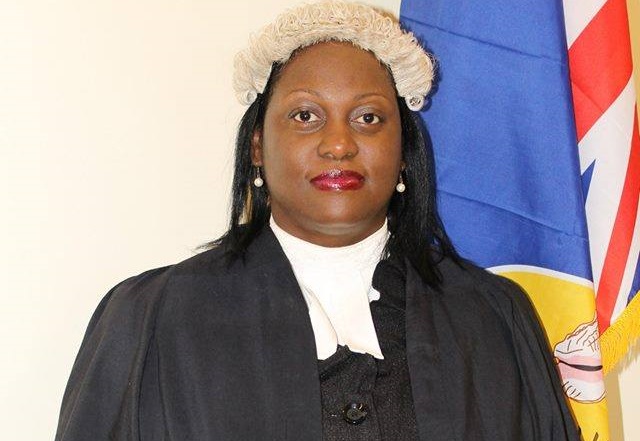News
The Public Sector Employees Pension Fund Bill 2022
Published
4 years agoon

#TurksandCaicos, March 18, 2022 – Mr. Speaker, I am pleased to present the Public Sector Employees Pension Fund Bill 2022, on behalf of the Public Service and the wider public sector of the Turks and Caicos Islands. The presentation and anticipated approval of this Bill will mark an important date in the history of the public service of the Turks and Caicos Islands.
Mr. Speaker, it goes without saying that the Public Sector plays an integral role in supporting the government of the day in carrying out its mandate in all facets of society, including education, healthcare, security and safety in these islands.
Mr. Speaker, I am sure that I speak on behalf of all members of this Honourable House in expressing our sincere gratitude to public sector workers across the Turks and Caicos Islands for the important roles that they play and believe that it is the right of every public sector worker to not only be provided with the tools that allow them to appropriately carry out the roles that are recruited to do, but that they also receive fair compensation and benefits for doing so.
The public service underwent a number of changes in previous years including a significant reduction in manpower as well as revisions to civil servants’ pay and benefits in 2012 due to fiscal hardship experienced at that time.
Since 2012, the civil service benefited from the implementation of a new pay and grading system, an across the board salary increase as well as a number of other investments, however the implementation of this new pension and gratuity program will mark a milestone achievement.
The Public Sector Employee Pension Fund Bill 2022 is being proposed to create a Defined Contribution Pension Plan for Public Sector workers.
Prior to April 6, 1992 the Turks and Caicos Islands Government provided a fully funded Public Service Pension to all employees.
This practice ceased on April 6, 1992 when the National Insurance Scheme was established. However, post 1992 employees were still paid a gratuity for their years of service.
This practice however, ceased during the interim period in 2012 due to the government’s fiscal instability at that time.
This resulted in post 1992 employees during the period April 2012 to present, with the exception of vacation pay which is nonexistent for unwell persons that would have utilized all of their leave, not receiving any form of terminal benefit for their years of service to the government and people of these islands.
This has caused numerous concerns as there is a disparity in the benefits received by different persons in the civil service; a number of which have expressed difficulty in being able to transition into retirement at the age of 60 as there is no payment to assist as was previously the case.
Additionally, if a person passes away while in service there is no benefit to be received by their families, some of which are young children that still require significant care and financial resources.
Whilst persons post 1992 are entitled to a NIB Pension, this alone is considered to be inadequate as the maximum payment is 60% of final average insurable earnings, with those who earn more than the ceiling, now $4,000 per month having an even lower replacement rate.
As the current situation caused hardship on a number of public servants and has had the impact of demoralizing public servants, a Benefits Committee was established under the Chairmanship of the Deputy Governor in 2018 to review the feasibility of the reestablishment of a Turks and Caicos Islands Government Pension and or Gratuity Program for its employees.
The Office of the Deputy Governor in the financial year 2018/2019 received funding for a consultancy to assist in carrying out a Review Towards the Reestablishment of a TCIG Pension and Gratuity Program resulting in the award of a contract to Morneau Shepell now Lifeworks.
In March 2020 a report was presented to the Cabinet which gave options for consideration, with the Defined Contribution Program being the preferred option and a request for funding for implementation. The report and recommendations was noted by the then Cabinet.
In May 2021 the report was presented to the Cabinet again with a request for implementation, subsequently resulting the approval of $2m for seed funding for implementation.
The Pension and Benefits Committee consisting of membership from the Ministry of Finance, Chambers, HR, the Treasury, and Senior Permanent Secretaries held over 20 meetings throughout the intervening period to consider options, to make policy recommendations and to carry out consultation with the CSA, Statutory Bodies, general public service and private sector regarding implementation.
The result of which is the presentation of a Bill today which not only encompasses the public service and interested statutory bodies, but also makes provisions for participation by the wider private sector in these islands thereby creating at some later stage a TCI Multi Employer Pension Program.
This Bill seeks to establish a defined contribution pension fund for public sector employees. The purpose of the Fund is ensure that eligible public sector employees are provided with some form of benefits when they leave the public sector due to termination, resignation, retrenchment, retirement or become disabled or that the benefits is paid to their beneficiary if the officer dies. Most public sector employees do not currently have an employer linked pension arrangement. This plan is being established primarily to supplement employees NIB Retirement benefit, enabling them to have additional income in old age. It is also intended to provide an option for public sector employees to save more than the minimum required and have those savings professionally invested at a reduced cost. The Fund will work like a savings account. Every month members and their employers will pay mandatory contributions into the into Fund at the rate of 3% employee and 3% employer. In addition to the mandatory contribution, members will also be able to make voluntary contributions to the Fund. The maximum voluntary contributions deductible from salary is 10%. The Board or invest managers will then invest this money so that it grows. The money made from investing the contributions is added directly to members’ accounts in the form of interest.
Mr. Speaker, the Bill is made up of six Parts.
PART I of the Bill contains the preliminary provisions. Clauses 1 and 2 of the Bill make provision for the short title, commencement and interpretation.
PART II of the Bill establishes the Public Sector Employees Pension Fund. It sets out the purposes of the Fund. It makes provision for membership of the Fund and management and administration of the Fund. It provides that in the Fund shall be held by the Public Sector Employees Board in trust for the members of the Fund. It also provides for payment of contributions into the Fund. The contribution payable to the Fund shall be 3% of the employee’s monthly salary and 3% will be contributed by the employer. Members can also pay voluntary contributions into the Fund of up to 10% of their monthly salary.
PART III of the Bill provides for the payment of benefits. The following benefits are payable, namely: normal, early and late retirement benefits, disability retirement benefit and benefits to a member’s beneficiary on the death of a member etc.
PART IV of the Bill establishes the Public Sector Employees Pension Board, which is the body charged with the responsibility of administering and enforcing the provisions of the Ordinance and management of the Fund. The Board is vested with several responsibilities including that to administer the Fund. The conduct of business and affairs of the Board shall be as provided in this Part. Clause 37 to 53 contain provision outlining the composition of the Board; the functions of the Board, meeting and the procedures for meeting, as well as how decisions are to be made by the Board.
PART V of the Bill sets out the financial provisions applicable to the Fund. These include accounting and audit procedure. It sets the requirements for financial statements, annual reports and actuarial review of the Fund. The Board is required to carry out periodic reviews of its operations and to submit a report of such to the Governor and the Minister. The Minister shall cause a copy to be laid before the House of Assembly
PART VI of the Bill contains Miscellaneous provisions and deals with a number of general provisions. Clause 60 to 70 makes provision for how claims are to be made, determination of claims and questions, correction of mistakes, confidentiality, etc.
Some of the benefits of this new program is that:
- Savings accumulate over persons’ career
- Both the employer and the employees contribute; although TCIG has taken a decision to cover the full costs on behalf of its employees
- Benefits for early exit, death and disability are easily offered
- Voluntary additional employee contributions are possible
- There are Portable benefits
Under the new scheme 6% of employees basic salary will be paid into the pension scheme for their benefit.
Government has also taken a decision to compensate all current employees for their previous years of service by approving a 3% past service credit for all years previously served.
This is just a few of the benefits under this new program, which will make a monumental change for the benefit of the public service in these islands.
This legislation marks the beginning of a new and very important chapter for the public service of the Turks and Caicos Islands.
It has taken a lot of hard work and a commitment to significant financial resources to allow us to be where we are today, but we are proud of this initiative and truly believe that it will be to the benefit of the public service of the Turks and Caicos Islands.
We are grateful to the government of the Turks and Caicos Islands for supporting the implementation of this new program through: the funding of the initial consultancy; funding of $2m for the initial deposit into the new Pension Fund; the commitment to cover both the employee and employer contribution to commence this program and the commitment to fund the past service credit of approximately $23m to compensate all current staff for their previous years of service.
We wish to record our thanks to the members of the Benefits Committee chaired by Her Excellency Anya Williams for their hard work, dedication and commitment to the establishment of this program, in particular the Attorney Generals Chambers led by the Attorney General Honourable Rhondalee Braithwaite Knowles, Senior Legislative Drafter Ms. Desiree Downes; Permanent Secretary of National Secretary and former Director of the Deputy Governor’s Office Mr. Tito Lightbourne; Permanent Secretary of Finance Mrs. Athenee Harvey-Basden; Permanent Secretary of Education Mr. Wesley Clerveaux; HR Director Mr. Mark Greenway; Accountant General Mr. Hemant Sinanan and Managing Partner of Life Works Mr. Derek Osborne, all members of the TCIG Benefits Committee.
We also express our thanks to the President and members of the Civil Service Association in particular Mr. Demarco Williams for his support throughout and to the entire public service for their patience and understanding while we worked tirelessly to bring this program to fruition.
Today is a good day for the public service of these islands!
RESPONSE TO THE DEBATE
Mr. Speaker, some portions of today’s debate brought to mind that old saying, “Don’t let perfect be an enemy of the good”.
Mr. Speaker, I almost got up on a point of order to say complain that I was being accused of improper motives. Not at all Mr. Speaker, nothing of the sort. Mr. Speaker, this Bill does not seek to exclude any public office holder, elected or otherwise.
In fact, Mr. Speaker, the Bill defines the Minister as the Minister of Finance in section 2.
Clause 57. (1) of the Bill the Board is required to —
(a) prepare a report with regard to the state of affairs, the business and the financial position of the Fund, the degree in which the purpose of the fund has been furthered and of its activities during the last preceding year and shall furnish that report to the Governor and the Minister not later than the 30 September.
(b) submit to the Governor, the Minister and the Chief Auditor every account certified by the Auditor together with the report of the Auditor thereon, within one month of such certification;
(c) submit annually to the Governor and the Minister an account of the securities in which monies of the Fund are for the time being invested.
Mr. Speaker, as I indicated in my address, it is the Minister shall cause a copy of every account or report submitted to him under this section to be laid before the House of Assembly.
Additionally, in respect of the actuarial review of operation of Fund, clause 58. (1) of the Bill further requires the Board, with the assistance of an actuary, to review the operation of this Ordinance during the period ending with 31 March in every third year; and at each such review shall make a report to the Governor and Minister on the financial condition of the Fund and the adequacy or otherwise of contributions to support benefits, having regard to its liabilities under the Ordinance.
The Minister must then, as soon as possible after receiving a report in accordance with subsection (1), lay a copy of it before the House of Assembly.
The fundamental principle that underpins the drafting of this Bill Mr. Speaker, is found in the Constitution. A provision that has been in our Constitution since the very first Constitution and not connected to any allegation or aspirations against anyone.
Mr. Speaker, that grant and withholding of pensions, etc. is captured in section 96 of the Constitution which provides that:
(1) The power to grant any award under any pensions law in force in the Islands (other than an award to which, under that law, the person to whom it is payable is entitled as of right) and, in accordance with any provisions in that respect contained in any such law, to withhold, reduce in amount or suspend any award payable under any such law is hereby vested in the Governor, acting in his or her discretion.
(2) In that section “pensions law” means any law relating to the grant to any person, or to the widow or widower, children, dependants or personal representatives of that person, of an award in respect of the services of that person in a public office, and includes any instrument made under any such law.
That it Mr. Speaker, nothing more. Nothing sinister.
Mr. Speaker, the Hon. Leader of the Opposition has only recently reminded us, this aphorism: “don’t let perfect be an enemy of the good” which is an old Italian proverb first made popular by Voltaire who used it in his poem La Bégueule. The literal translation is, the best is not the enemy of the good.
Other philosophers and writers have expressed the thought in slightly different ways. Confucius: “Better a diamond with a flaw than a pebble without.” Shakespeare: “Striving to better, oft we mar what’s well.”
Mr. Speaker, we know that perfection is impossible to achieve, so pursuing it is sometimes counterproductive, inefficient and produce diminishing returns. We need to know when good is good enough.
Obviously, there are situations when setting the highest standard is important. I want my pharmacist to be fastidious when filling my prescriptions and pilots should be perfectionistic when evaluating a plane’s airworthiness.
But Mr. Speaker, don’t let perfect become an enemy of good and Mr. Speaker, the majority of members’ contributions have shown, this is very good bill and something that we can and should all be proud of.
Mr. Speaker, there are 2,437 established and waged positions budgeted in the public service, including the RTCIPF. This Bill would ensure that those persons have a pension and gratuity when they leave public service, not to mention the many other persons employed across the public sector.
Mr. Speaker, save for about 100 of those persons who are eligible for pension under the Pensions Ordinance and the minority who are entitled to gratuity, every other person would leave the public service without anything at all, no matter how long or how well they have served. Mr. Speaker, under these proposals, it doesn’t matter if a qualifying person resigns, is terminated, retires, is made redundant, or however he or she leaves the public service with something. And if, God forbid, he or she dies, his or her beneficiary is able to receive a benefit. Mr. Speaker, this is a very good Bill.
Mr. Speaker, although I am proud to be a member of this Honourable House, I am not a politician and I do not subscribe to the politicization of these proposals because I made clear in my address to the Bill that the former and the current administrations had a role to play in bringing this Bill to the House today. Mr. Speaker this Bill arrived here today following a collaborative, consultative process, having had the benefit of professional advice and careful consideration. Further careful consideration will have to be given to what to do for those persons who left the service without anything at all, but Mr. Speaker, the government should rightly be proud of this initiative Mr. Speaker because this is a watershed moment in the sense that it marks an important historical change of course and an important development toward retirement security for current and future public sector workers.
Pension (Amendment) Bill 2022
Mr. Speaker, on behalf of the Public Service, I am pleased to present the Pension (Amendment) Bill 2022.
This Bill seeks to amend the Pensions Ordinance to provide the circumstances in which pension may be granted under the Ordinance to a public officer employed in the public service prior to 6th April 1992 and to restore the option for a public officer to whom a pension is granted under the Ordinance to elect to be paid a gratuity and reduced pension.
Mr. Speaker, prior to April 6, 1992 the Turks and Caicos Government provided a fully funded pension to all public officers appointed to permanent and pensionable posts. That program remains in place for all persons appointed prior to 6th April 1992 permanent and pensionable public officers save that an amendment was made in 2012 which removed the right to elect to receive a gratuity payment and a reduced pension.
The above amendments ensure that all 100 persons currently enrolled in the previous pre 1992 program are secured their right to apply for a pension and have the opportunity to benefit from a gratuity payment.
Clauses 3 of the Bill seek to amend the section 6(a) of Ordinance by repealing and substituting subparagraph (i) to provide that pension or gratuity may be granted to an officer who retires from the public service on or after he attains the age of sixty years or after completing thirty years of service, or in special cases with the approval of the Governor, fifty-five years.
An officer who retires on completing 30 years of service and to whom a pension is granted may in lieu of such pension be paid, immediately upon his retirement, a gratuity calculated in accordance with regulation 23 and reduced pension calculated in accordance with regulation 23 after he attains the age of sixty years.
Clause 4 of the Bill seeks to amend the Ordinance by repealing and substituting section 8 to provide for compulsory retirement at any time after attaining the age of sixty years or after completing thirty years of service, or in special cases, with the approval of the Governor, at any time after attaining the age of fifty-five years.
Clause 5 of the Bill seeks to repeal section 13 which provides that pension granted under the Ordinance may cease on imprisonment of the person to whom a pension has been granted.
Clause 6 of the Bill seeks to amend the Pensions Regulations contained in the Schedule to the Ordinance by repealing and substituting regulation 23 to restore the option for a public officer to whom a pension is granted under the Ordinance to elect to be paid a gratuity and reduced pension.
You may like
News
Commonsense, Not Confrontation: Why Kamla Persad-Bissessar Is Right
Published
3 weeks agoon
December 27, 2025
This debate did not start with Donald Trump, and it did not start this month.
For more than a decade, this reporter has had a front-row seat to repeated, urgent calls from across the Caribbean for stronger intervention by the United States in response to gun- and narcotics-fuelled violence that has hollowed out our communities. Long before today’s headlines, leaders warned that transnational gangs were outgunning police, draining public resources and stealing our youngest people.
Much of the public messaging leaned toward calls for fewer guns flowing from the United States, but the practical response from Washington evolved into something else: tactical undergirding of the Caribbean. Training, intelligence sharing, maritime surveillance and joint operations expanded under successive U.S. administrations — Republican and Democrat alike.
Then came Venezuela.
President Nicolás Maduro proved himself an unhinged and destabilising force, openly threatening Guyana’s oil-rich territory and pushing the region to the brink of a conflict no Caribbean state could afford. The United States showed up. The threat of war was blunted. That mattered.
But while geopolitical flames were contained, the narcotics trade exploded.
CARICOM convened emergency meetings on transnational gang violence. Crime became so pervasive that it was formally classified as a public health threat. Entire communities were terrorised. Courts clogged. Police forces stretched beyond capacity.
And now — quietly but noticeably — the tempo has shifted.
While no single forensic study can capture the full picture, it is easily verifiable on the ground that major narcotics busts and trafficking activity have slowed in recent months. Something has changed. Pressure works.
This is the reality Prime Minister Kamla Persad-Bissessar is responding to.
Her critics accuse her of breaking ranks. What she is actually doing is refusing to indulge in strategic hypocrisy — demanding international help to confront narco-terrorism while appearing to defend or excuse the very networks and actors we have spent years condemning.
Sovereignty is not an insult. The Caribbean invokes it constantly. To deny it to the United States — especially when the policies in question were telegraphed months in advance and remain adjustable — is not diplomacy. It is posturing.
What is most troubling is the region’s selective memory. CARICOM has directed months of rhetorical fire at Trump-era policies, yet when disaster struck — from security crises to Hurricane Melissa — the United States remained one of the region’s most reliable supporters. Outcomes matter more than allegiance theatre.
Kamla Persad-Bissessar is not suffering from Trump Derangement Syndrome. She is applying commonsense statecraft. She understands that small states do not gain leverage by moral outrage alone, and that credibility is lost when we appear aligned with individuals, regimes or activities we ourselves have deemed a threat.
Her warning to CARICOM is simple and necessary: do not undermine your own cause.
The Caribbean’s fight against narco-violence, corruption and instability has been long, costly and painful. If pressure is finally producing results, we should be wise enough to recognise it — and brave enough to say so.
Angle by Deandrea Hamilton. Built with ChatGPT (AI). Magnetic Media — CAPTURING LIFE.
News
Beaches Turks and Caicos Showcases and Supports Local Creativity
Published
4 months agoon
September 12, 2025
September 12, 2025
PROVIDENCIALES, Turks & Caicos Islands – The Turks and Caicos Islands are home to a wealth of creativity, from artisans and craft vendors to musicians and performers. Beaches Turks and Caicos, the Caribbean’s leading all-inclusive family resort, has pledged its continued support for these individuals by providing meaningful platforms for them to share their skills and stories with guests from around the world.
The resort’s commitment is most evident in its weekly Cultural Night showcase, where visitors are immersed in the vibrant traditions of the islands. Guests enjoy live performances which feature local music genres such as ripsaw, while artisans display and sell handmade creations. This event not only enriches the guest experience but also strengthens economic opportunities for local entrepreneurs.
Entertainment Division Manager Garett Bailey emphasized the significance of Cultural Night, “we want to showcase everything the Turks and Caicos Islands culture has to offer. Our goal is for guests to leave with a deeper appreciation of the island’s art, music and traditions, while giving local talent the opportunity to share their creativity with visitors from across the globe.”
Beyond Cultural Night, Beaches Turks and Caicos also welcomes local craft vendors onto the resort every Wednesday and Friday where they are offered a direct space to market their goods. Guests have easy access to the Turks and Caicos Cultural Marketplace, where they can purchase authentic local arts and crafts.
where they are offered a direct space to market their goods. Guests have easy access to the Turks and Caicos Cultural Marketplace, where they can purchase authentic local arts and crafts.
Managing Director, James McAnally, highlighted how these initiatives reflect the resort’s broader mission, “we are committed to celebrating and sharing the vibrant culture of these islands with our guests. By showcasing local artistry and music, we not only provide entertainment but also help sustain and grow the creative industries of the Turks and Caicos Islands. From our cultural showcases to nightly live music, we are proud to create authentic connections between our guests and the people of these islands.”
Local musician Keon Hall, who frequently performs at the resort, expressed gratitude for the ongoing partnership, “being able to share my music with Beaches’ guests has created lasting relationships. Some visitors return year after year and request songs from previous performances. This partnership continues to celebrate what we do and strengthens the bond between local artists and the resort.”
The resort’s support of local artisans and entertainers extends beyond business opportunity; it is about preserving heritage and sharing stories. Guests take home more than souvenirs; they leave with experiences that deepen their understanding of Turks and Caicos’ culture and history.
Public Relations Manager, Orville Morgan, noted the importance of this commitment, “for many visitors, these interactions represent their first genuine connection to the Turks and Caicos Islands. From artisans and musicians to farmers and transport operators, our local talent helps shape every guest experience. At Beaches, we are proud to give them the stage to share their stories and their heritage.”
Beaches Turks & Caicos remains dedicated to developing cultural connections and supporting the artisans, musicians and entrepreneurs whose creativity makes the Turks and Caicos Islands unique. Each guest experience is an opportunity to celebrate and sustain the spirit of the islands.
Caribbean News
“Barbecue” is Cooked! US Turns Over 11 Million Haitians into Potential Informants with $5 Million Bounty
Published
5 months agoon
August 12, 2025
August 12, 2025
The United States just set fire to the underworld in Haiti — and this time, the smoke might finally flush out the man many call the most feared in the Caribbean.
On Tuesday, the U.S. government slapped a $5 million bounty on the head of Jimmy “Barbecue” Chérizier, the ex-police officer turned gang boss accused of orchestrating massacres, torching neighborhoods, and strangling Haiti’s capital into chaos. This isn’t just a headline — it’s a full-blown game-changer.
turned gang boss accused of orchestrating massacres, torching neighborhoods, and strangling Haiti’s capital into chaos. This isn’t just a headline — it’s a full-blown game-changer.
That kind of cash — offered under the State Department’s Transnational Organized Crime Rewards Program — is enough to turn the country’s entire population, more than 11 million people, into potential informants overnight. Add the millions in the Haitian diaspora, and Chérizier isn’t just wanted. He’s surrounded.
The Number That Changes Everything
Five million U.S. dollars today equals about 655 million Haitian Gourdes. In a country where many scrape by on less than $5 a day, that’s not just life-changing — it’s life-defining. It’s enough to rebuild homes, put generations through school, or buy a one-way ticket far from the gunfire.
In a place where trust is scarce and survival is everything, that figure is more than tempting — it’s irresistible. For Chérizier, it means every friend could be a future informant, and every loyalist might be calculating the cost of staying loyal.
‘We Will Find Them’ — Jeanine Pirro, U.S. Attorney
Jeanine “Judge Jeanine” Pirro, the U.S. Attorney, set the tone with fire in her voice. “This indictment is the first of its kind,” she announced. “Jimmy Chérizier, also known as ‘Barbecue,’ is a notorious gang leader from Haiti who has orchestrated and committed various acts of violence against Haitians, including the 2018 La Saline attack in which approximately 71 people were killed. He both planned and participated in that massacre.
“Anyone who is giving money to ‘Barbecue’ cannot say, ‘I didn’t know.’ They will be prosecuted, and we will find them. They are supporting an individual who is committing human rights abuses, and we will not look the other way.”
Pirro wasn’t just going after Chérizier. She was sending a warning to the Haitian diaspora accused of feeding his war chest from abroad: the days of claiming ignorance are over.
‘No Safe Haven’ — Darren Cox, FBI
Then came Darren Cox, Deputy Assistant Director of the FBI, delivering the muscle of America’s most powerful investigative force. “There is no safe haven for Chérizier and his network,” Cox declared. “We are closing every link, every cell.” Since January, he said, the FBI has arrested three Top Ten fugitives, taken more than 19,000 criminals off the streets, and seized thousands of tons of narcotics — enough to save millions of lives across the U.S.
The FBI’s Miami and Houston offices have already bagged one of Chérizier’s Viv Ansanm associates inside the United States without firing a shot. “These efforts are a deliberate and coordinated plan,” Cox said, “to protect our communities and confront escalating threats from terrorist organizations like Viv Ansanm.”
‘Three-Year Investigation’ — Ivan Arvelo, HSI
Ivan Arvelo, Assistant Director of Homeland Security Investigations, brought the receipts. “This is the result of a three-year investigation into Chérizier’s procurement networks, cash pipelines, and operational financing that violates sanctions,” he explained. Arvelo described 400 structures destroyed, entire communities erased, and a gang exploiting U.S. dollars, technology, and immigration loopholes to keep its killing machine running. “We tracked how Americans unwittingly bankrolled brutality,” he said — proof that the net is tightening both inside Haiti and abroad.
‘The Worst of the Worst’ — Chris Lambert, State Department
Chris Lambert, representing the State Department’s International Affairs division, gave the political bottom line.
“Mass violence in Haiti must end,” Lambert said. “The instability resulting from Chérizier’s actions fuels illegal migration, regional instability, and transnational crime. We will continue to apply every tool available — including our rewards programs — to stop the spread of unchecked violence, especially to target the worst of the worst criminal leaders threatening the people of our hemisphere.”
instability, and transnational crime. We will continue to apply every tool available — including our rewards programs — to stop the spread of unchecked violence, especially to target the worst of the worst criminal leaders threatening the people of our hemisphere.”
Lambert confirmed what many have long known: Chérizier is not just a gang leader. He commands Viv Ansanm, officially designated in May as a Foreign Terrorist Organization. In the eyes of the U.S., that makes him not just Haiti’s problem — but everyone’s.
Why Haitians May Not Resist
In Haiti, money talks — loudly. And when you put 655 million Gourdes on the table, it shouts.
That’s the kind of figure that turns casual acquaintances into informants and makes even the most hardened loyalist wonder if the payout is worth more than the risk. It’s not a matter of “if” word gets out, it’s a matter of “who will be first to collect.”
For grieving families, it’s a chance at justice. For the desperate, it’s a chance at survival. For Haiti as a whole, it’s hope — wrapped in the most dangerous of temptations.
An Answer to Prayers
For years, Haiti’s headlines have been a scroll of horrors — kidnappings, executions, burned neighborhoods, bodies in the streets. Chérizier’s name has been attached to too many of them.
This move by the U.S. isn’t just strategy. It’s personal. It’s a signal to every Haitian — at home or abroad — that the days of impunity could be ending.
I’ll admit it: when I heard the news, I danced, I sang, and I nearly cried. Not because $5 million is a lot of money, but because of what it means — the possibility, at last, of stopping the man accused of helping turn Haiti into hell on earth.
Four officials, four angles, one mission: Pirro’s fire, Cox’s grit, Arvelo’s precision, Lambert’s conviction. Together, they’ve put the heat on “Barbecue” like never before.
BBQ is cooked. The only question now is: which one of over 11 million potential informants will serve him up?







